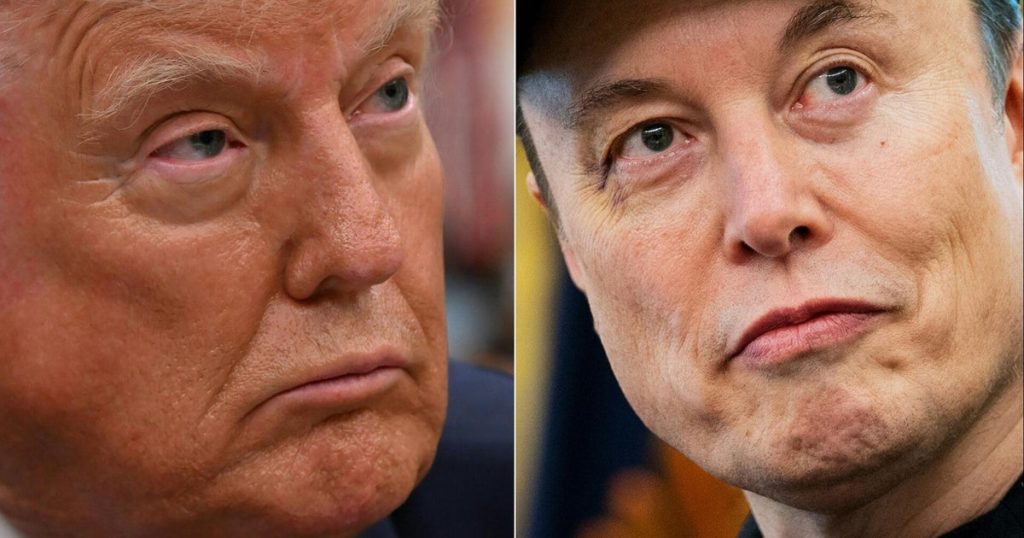In a recent exchange, President Trump has sharply criticized tech entrepreneur and former aide Elon Musk over the subsidies he reportedly receives from the government. This verbal conflict reignited amid Musk’s vocal opposition to Trump’s proposed spending bill, further deepening their tumultuous relationship. The controversy touches on a range of issues, including fiscal responsibility, government efficiency, and the direction of political discourse in light of Musk’s aspirations for a new political party.
| Article Subheadings |
|---|
| 1) Trump’s Critique of Musk’s Subsidies |
| 2) Musk’s Response and Political Aspirations |
| 3) Divided Republican Opinions on Spending Bill |
| 4) Consequences for Musk’s Political Donations |
| 5) Key Implications for the Future Political Landscape |
Trump’s Critique of Musk’s Subsidies
President Trump took to his social media platform early Tuesday to express his dissatisfaction with the amount of government subsidies being allocated to Elon Musk. “Elon may get more subsidy than any human being in history, by far,” Trump stated. He insinuated that, without these financial supports, Musk’s business ventures would face insurmountable challenges, compelling him to return to his native South Africa.
This public rebuke is emblematic of Trump’s strategy to leverage his social media following to influence public opinion. The statement signifies not only a personal attack on Musk but also a broader critique of governmental spending and fiscal responsibility. By painting Musk as a beneficiary of excessive subsidies, Trump aims to underline the necessity for reforms in government efficiency and accountability.
Musk’s Response and Political Aspirations
In response to Trump’s comments, Elon Musk reiterated his criticisms of the President’s flagship spending bill. As discussions about the bill progress in Congress, Musk has voiced aspirations for creating a new political party, positioning himself as a conduit for potential political reform.
Musk’s previous public feuds with Trump have highlighted a fracture between traditional Republican values and the new wave of independent political thought that Musk appears to advocate. His recent assertions questioning the financial viability of the government’s fiscal approaches resonate with many who are disillusioned by rising national debt. “All I’m asking is that we don’t bankrupt America,” Musk declared on social media, challenging the rationale behind repeatedly raising the country’s debt ceiling.
Divided Republican Opinions on Spending Bill
As the legislative landscape evolves, the Republican Party finds itself in a complex position regarding Trump’s proposed spending bill. With an estimated cost of $4.5 trillion, the “One Big Beautiful Bill” aims to extend expiring tax cuts while augmenting border security measures.
However, fissures have emerged within the party as some members express concerns over the long-term fiscal implications of the proposal. Among the criticisms, many argue it would strip healthcare from millions of low-income Americans, a stance several bipartisan groups have validated. These divisions become increasingly significant as Republicans look toward the 2026 midterm elections, where the stakes for both Trump and congressional candidates are substantial.
Consequences for Musk’s Political Donations
Earlier last month, President Trump warned of potential “serious consequences” for Musk if he continues to support Democratic candidates who oppose Republicans favoring the budget measure. This warning highlights the growing tension between conventional party values and the disruptive, independent rhetoric that Musk represents.
Trump’s comments reflect a deeper concern within the GOP regarding loyalty and the party’s objectives moving forward. This dynamic could lead to significant shifts in political alliances as financial backing becomes a tool for the political machine, setting a precedent that could influence future donor behavior and candidate support.
Key Implications for the Future Political Landscape
The ongoing conflict between Trump and Musk underscores a pivotal moment in American politics, where traditional party lines are being blurred by new voices challenging the status quo. These developments raise questions about the future direction of political discourse, especially as figures like Musk seek to assert influence over a more centrist or independent voter base.
As the political landscape continues to evolve, the ramifications of this feud could extend far beyond the immediate implications of the spending bill. The contrasting ideologies between traditional party loyalty and a growing demand for reform suggest a more complex electoral environment ahead, where independent voices could play an increasingly significant role. The intersection of technology, business interests, and political influence epitomizes the shifting dynamics within American society.
| No. | Key Points |
|---|---|
| 1 | President Trump has criticized Elon Musk for the government subsidies he receives. |
| 2 | Musk has expressed an interest in forming a new political party amid these critiques. |
| 3 | Reactions within the Republican Party are divided over Trump’s proposed spending measure. |
| 4 | Trump has warned of consequences for Musk if he financially supports Democratic candidates. |
| 5 | This conflict highlights a significant shift in the political landscape in the U.S. |
Summary
The confrontation between President Trump and Elon Musk underscores vital debates surrounding fiscal policy and government efficiency. As Musk positions himself independently from Trump, the insights gained from their exchange may influence future political alignments and voter sentiments leading into the 2026 midterm elections. The evolving dynamics within the Republican Party and emerging independent political voices indicate a landscape ripe for change, potentially reshaping how governance and economic strategy are viewed in American society.
Frequently Asked Questions
Question: What sparked the recent exchange between Trump and Musk?
The exchange was sparked by Trump’s criticism of the substantial government subsidies Musk reportedly receives, which Musk countered with critiques of Trump’s proposed spending bill.
Question: How does Musk plan to respond to the political landscape?
Musk has indicated interest in forming a new political party, potentially providing a platform for reform and challenging traditional party lines.
Question: What are the implications of the spending bill proposed by Trump?
The spending bill aims to extend expiring tax cuts and bolster border security but raises concerns over increased national debt and healthcare access for low-income Americans.


